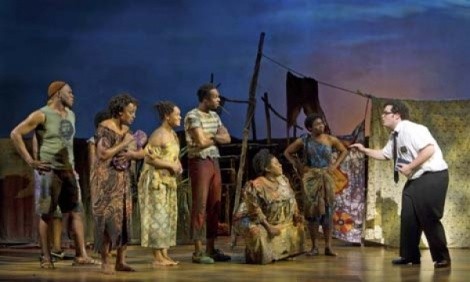
- Elder Cunningham (Josh Gad) bears his testimony to the Ugandans
Thus, we get a musical where one song has a chorus of “Fuck you, God,” but later the entire cast sings “Tomorrow Is a Latter Day,” a song so unabashedly warm and fuzzy it’s hard to believe it’s not in the Children’s Primary Songbook and that Deseret Book doesn’t sell rings with the acronym TIALD. The balance of sweet-and-sour is so finely tuned that while Elder Price (Andrew Rannells) sings about his Mormon beliefs (Jesus came to America, God lives on a planet called Kolob, etc.) in a way that must sound crazy to non-Mormons, at the same time, there’s no doubt that everyone in the theater is rooting for the elder as a hero.
The main theme of the show is that while everyone is entitled to believe what they want, it’s your good works that really matter. Using that as a measure of a religion, it’s clear that Parker, Stone and Lopez think quite highly of Mormons. Besides, if your theme is that works trump doctrines, what better group is there to illustrate the point than a religion with teachings outside the Christian mainstream that is still somewhat well known thanks to its TV ads and a massive missionary program? Pair up two mismatched young missionaries and you’ve got a classic buddy plot combined with a coming-of-age story. The Book of Mormon takes all of this, and from the moment the Angel Moroni located above the stage blows his horn to signal the start of the show, we’re off and running with a well-paced plot and plenty of catchy tunes in a performance that is at once hilarious, blasphemous and kind.
Elder Price is the perfect missionary who gets paired with the sweet misfit Elder Cunningham (Josh Gad). “All my friends always end up leaving me, but you can’t,” Cunningham tells Price in summing up the missionary experience. The pair gets sent to a village in Uganda beset by famine, poverty, AIDS and a warlord who wants to conduct a mass female circumcision. (If there’s any group that should be offended by the stereotypes in The Book of Mormon, it’s Ugandans.)
A young Ugandan woman, Nabalungi, played by Nikki M. James, looks to the elders for help. If this show catches on, Utahns should be prepared that when they travel outside the state, people will ask them if they are from “Salt-a-Lake-a See-tee,” which is how Nabalungi sings about the place she longs to live. Of course, nobody other than a Salt Laker can better appreciate the irony when Nabalungi is later told, “Salt Lake City isn’t an actual place. It’s a metaphor.”
Parker, Stone and Lopez get the Mormon doctrine mostly correct and are pretty dead-on with the cultural references with some exceptions. In the preview I attended, the Mission President said, “Praise Christ,” which any Mormon will tell you is much too emotional and not used in the faith. The process for how the elders receive their callings and get sent out into the world is different from how it actually happens, but this appears to have been done for plotting reasons more than anything else. Ultimately, these are small quibbles about a show that is so accurate in its knowledge of Mormons that a song about Elder Price’s “Spooky Mormon Hell Dream” features dancing coffees right alongside Hitler.
The Book of Mormon has plenty of material that will offend, but it’s thrown together with material that Utahns will recognize as hitting the comedic spot while also coming straight from the heart.